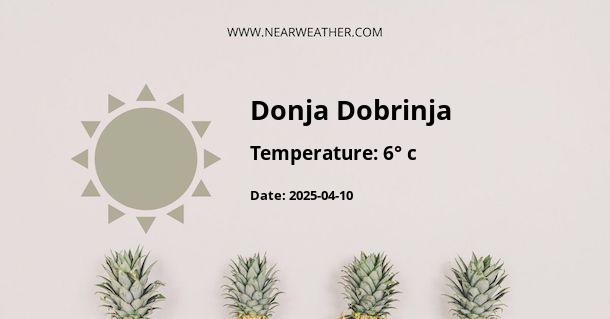Introduction to Donja Dobrinja, Bosnia and Herzegovina
Donja Dobrinja is a village in the heart of Bosnia and Herzegovina, a country characterized by its rich history, cultural heritage, and diverse climatic regions. Bosnia and Herzegovina’s climate is predominantly continental, with Mediterranean influences in the south. The climate and weather of Donja Dobrinja are subject to the complex interplay of atmospheric conditions influenced by its geographic location.
Geographic and Climatic Overview of Donja Dobrinja
Located within the continental part of Bosnia and Herzegovina, Donja Dobrinja experiences a moderate continental climate. This means that the village experiences four distinct seasons, each with its weather patterns and characteristics.
Temperature and Precipitation Patterns
| Season | Average Temperature Range (°C) | Average Precipitation (mm) |
|---|---|---|
| Spring | 5 - 15 | 60 - 95 |
| Summer | 15 - 25 | 70 - 100 |
| Fall | 5 - 15 | 70 - 105 |
| Winter | -5 - 5 | 65 - 95 |
Seasonal Overview
"The climate of Donja Dobrinja, like much of Bosnia and Herzegovina, is subject to considerable variability. This is due in large part to the region's diverse topography, with mountains, valleys, and rivers all influencing local weather patterns." – [Local meteorological expert]
- Spring: This season experiences a gradual increase in temperature and daylight hours. It is also characterized by frequent and occasionally heavy rain showers, contributing to the greenery and blooming of nature in and around the village.
- Summer: Typically warm and in some years can bring heat waves. However, due to Donja Dobrinja's continental positioning, summer nights often remain cool, providing relief from the daytime heat. During this season, the region can also experience thunderstorms, which are usually short-lived but can be intense.
- Fall: This season sees a drop in temperatures and daylight. Rainfall is quite abundant, which can occasionally lead to flooding in susceptible areas. Fall foliage in the surrounding forests and countryside can be quite scenic, attracting visitors for its natural beauty.
- Winter: The coldest season of the year, with temperatures often dropping below freezing. Snowfall is common, and snow can remain for several days or weeks, depending on the year. The winter season can also bring bouts of fog and overcast skies, decreasing visibility and temperatures further.
Distinct Climate Factors of Donja Dobrinja
The climate in Donja Dobrinja is influenced by several factors that contribute to its unique weather conditions throughout the year. These factors include its topography, the impact of the surrounding Dinaric Alps, and the village’s relative distance from the Adriatic Sea, which moderates the climate to some extent.
Topographical Influences
Donja Dobrinja, situated at an elevation that varies within the village, is surrounded by hilly terrain that can impact the movement of air masses, thereby affecting local weather patterns like precipitation distribution and wind flows.
Impact of the Dinaric Alps
The Dinaric Alps to the west create a barrier effect that influences Donja Dobrinja’s climate. This barrier can block or redirect the flow of air masses coming from the Adriatic Sea, leading to variations in weather both locally and regionally.
Proximity to the Adriatic Sea
Although somewhat inland, the village’s climate is slightly moderated by the presence of the Adriatic Sea. This body of water tends to temper both winter and summer extremes, although its effects are much more pronounced in coastal areas.
Climate Data and Weather Phenomena
To provide a more detailed outlook on the climatic conditions in Donja Dobrinja, it is essential to delve into meteorological data and research. Statistics derived from weather stations in the region can give a clearer picture of average conditions and help anticipate seasonal trends.
Climate Data Charts
Weather charts and tables, like the one provided above, compile averages over time to give insights into monthly temperature ranges, average rainfall, snowfall, and other important meteorological parameters.
Extreme Weather Events and Trends
When examining climate and weather in any specific location, it is also crucial to consider the frequency and impact of extreme weather events. In the case of Donja Dobrinja, such events might include severe thunderstorms, heavy snowfall, and occasional heatwaves.
Climate Change Implications
Climate change is an ever-present factor influencing weather patterns around the globe, and Donja Dobrinja is no exception. Changes in temperatures, precipitation, and extreme weather events must be monitored to understand long-term trends and potential implications for the village and its inhabitants.
Practical Tips for Visitors and Residents
- Check weather forecasts regularly, as the weather can change rapidly, especially in transitional seasons like spring and fall.
- Prepare for cooler nights, even during the summer, as the continental climate can cause significant diurnal temperature variations.
- In winter, be equipped for snow and ice conditions, which may affect transportation and accessibility in the area.
- Be aware of the potential for flooding during periods of heavy rainfall, especially in areas near rivers and streams.
- Take advantage of the pleasant weather during late spring and early summer, which is generally considered the best time to visit Donja Dobrinja for outdoor activities.
Armed with this comprehensive guide to Donja Dobrinja’s weather and climate, one can plan effectively for any season, whether engaging in agriculture, planning travel, or simply enjoying the serene beauty of Bosnia and Herzegovina’s countryside.
A - Donja Dobrinja's Latitude is 44.941391 & Longitude is 18.309441.
A - Weather in Donja Dobrinja is 6° today.
A - Climate Conditions in Donja Dobrinja shows scattered clouds today.
A - Humidity in Donja Dobrinja is 74% today.
A - Wind speed in Donja Dobrinja is 5.26 km/h, flowing at 225° wind direction. today.
